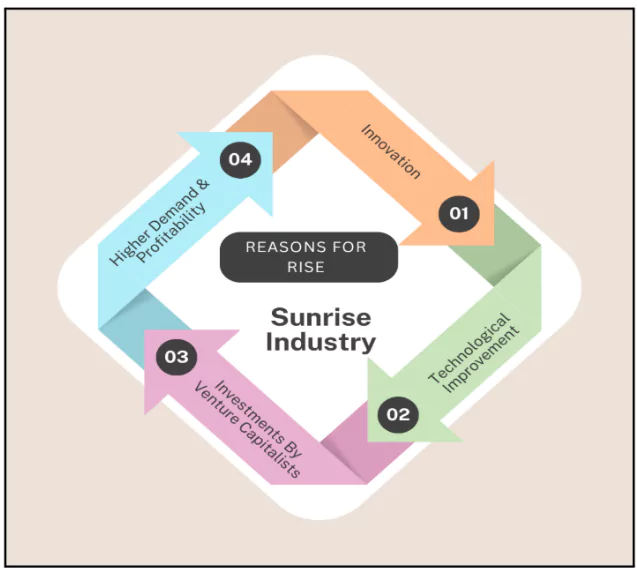Recently, India’s G20 Sherpa, Amitabh Kant, has emphasized the critical role of sunrise sectors for India to become a developed nation and achieve a $32 trillion economy by 2047.
Key Highlights of the Address
- Global Leadership in Sunrise Sectors: India must become a global champion in sunrise sectors to secure its economic future.
- Manufacturing of solar panels and electric vehicles (EVs) is vital to reducing dependence on imports and boosting domestic capabilities.
- Technological Shifts and Clean Energy: A radical shift towards cutting-edge technology is essential for India to remain competitive globally.
- Delivering cost-competitive clean technology solutions is critical to maintaining economic and environmental sustainability.
- Private Credit to GDP: India’s private credit-to-GDP ratio lags behind that of the US, Europe, and China. Increasing this ratio is essential to fuel growth in emerging sectors.
Enroll now for UPSC Online Course
What are Sunrise Sectors?

- Definition: Sunrise sectors are industries in their nascent stages but expected to grow rapidly and significantly impact the global economy.
- Examples:
- Clean Energy: Solar, wind, and green hydrogen.
- Electric Mobility: EV manufacturing and battery technologies.
- Digital Technologies: Artificial intelligence, blockchain, and quantum computing.
- Biotechnology: Genome editing and synthetic biology.
- Significance:
- Drive economic growth by creating jobs, fostering innovation, and improving competitiveness.
- Contribute to sustainability goals and energy independence.
Sunset Industry
- A sunset industry refers to an established sector experiencing decline due to factors such as poor market demand, lack of technological advancement, or changing consumer preferences.
- Characteristics:
- Decline in profitability and growth.
- Inability to adapt to new technology or market trends.
- Redundant machinery and high operational costs.
- Lack of product innovation and muted funding.
- Reasons for Decline:
- Limited innovation and stagnation in ideas.
- Market vulnerabilities and customer preference shifts.
- High costs of technological upgrades.
- Examples:
- Typewriter manufacturing: Replaced by computers and digital devices.
- Coal-based power plants: Declining due to a shift towards renewable energy.
- Landline telephony: Outpaced by mobile and internet communication technologies.
|
Exemplary Progress in Sunrise Sectors
- Renewable Energy: India ranks third globally in renewable energy capacity and is rapidly expanding its solar and wind power infrastructure.
- Initiatives like the National Solar Mission aim to install 500 GW of renewable capacity by 2030.
- Electric Vehicles: EV adoption has increased significantly, supported by initiatives like the Faster Adoption and Manufacturing of Hybrid and Electric Vehicles (FAME) scheme.
- Major auto manufacturers are investing in lithium-ion battery production and EV ecosystems.
- Digital Transformation: India has become a hub for startups in AI, machine learning, and blockchain, with increasing global recognition.
- Programs like Digital India and Startup India have fostered a conducive environment for tech-driven growth.
Check Out UPSC Modules From PW Store
Challenges for Sunrise Sectors in India
- Technological Lag: Indian industries, particularly in solar panel manufacturing, are 5-7 years behind global competitors, limiting market leadership opportunities.
- Infrastructure and Investment Gaps: Lack of advanced infrastructure for EV charging, renewable energy storage, and digital networks hampers scalability.
- Insufficient private credit to GDP ratio limits capital availability for startups and new ventures.
- Policy and Regulatory Barriers: Complex regulatory frameworks and delayed policy implementation discourage private investment.
- Import dependence on critical technologies and components increases costs and hinders domestic innovation.
- Skilled Workforce Deficit: A shortage of skilled professionals in cutting-edge fields like AI, renewable energy, and biotech constrains industry growth.
- High Dependence on Fossil Fuels: Despite strides in renewable energy, fossil fuels still dominate India’s energy mix, delaying the transition to clean energy.
Way Forward
- Policy Reforms and Incentives: Simplify regulatory frameworks to attract domestic and foreign investment in sunrise sectors.
- Offer tax breaks and subsidies for companies investing in clean energy and emerging technologies.
- Boosting Research and Development: Increase public and private investments in R&D, particularly in areas like EV batteries, solar panels, and AI applications.
- Establish centers of excellence for innovation in sunrise industries.
- Infrastructure Development: Expand infrastructure for EV charging stations, renewable energy grids, and digital networks to support growth.
- Develop industrial clusters for sectors like solar and EV manufacturing.
- Enhancing Financial Access: Strengthen India’s private credit-to-GDP ratio by encouraging banks and financial institutions to extend credit to startups and small businesses in sunrise sectors.
- Skill Development: Launch nationwide programs for upskilling and reskilling in emerging technologies.
- Collaborate with academic institutions to create industry-relevant curricula.
- Global Collaboration: Forge international partnerships for technology transfer and co-development in areas like green hydrogen and AI.
- Leverage platforms like G20 to position India as a hub for sustainable innovation.
Enroll now for UPSC Online Classes
Measures Taken to Boost Sunrise Sectors in India
| Measure |
Description |
Target |
| Make in India |
Aims to encourage manufacturing in India by providing incentives and reducing regulatory hurdles. |
To increase manufacturing’s share in GDP to 25% by 2025. |
| Atmanirbhar Bharat |
Promotes self-reliance by boosting domestic industries and reducing import dependence. |
To create a self-reliant economy with a focus on critical sunrise sectors. |
| Production-linked Incentive (PLI) Schemes |
Offers financial incentives to boost manufacturing in key sectors like Advanced Battery Storage, Pharmaceuticals, and Semiconductors. |
To attract investments of ₹1.97 lakh crore and create jobs across industries. |
| Faster Adoption and Manufacturing of Hybrid and Electric Vehicles (FAME) |
Encourages EV adoption by offering subsidies for electric vehicles and charging infrastructure. |
Targeting EV penetration of 30% by 2030. |
| National Quantum Mission |
Focuses on quantum computing and technology development in India. |
To build quantum computers with 50 qubits by 2030. |
| National Electric Mobility Mission Plan |
Supports the development and adoption of electric and hybrid vehicles. |
To make India a leader in EV manufacturing by 2026. |
| PM Formalisation of Micro Food Processing Enterprises (PM-FME) |
Provides financial, technical, and business support to micro food processing units. |
Formalize 2,00,000 enterprises and support ODOP (One District, One Product) by 2025. |
![]() 14 Jan 2025
14 Jan 2025

